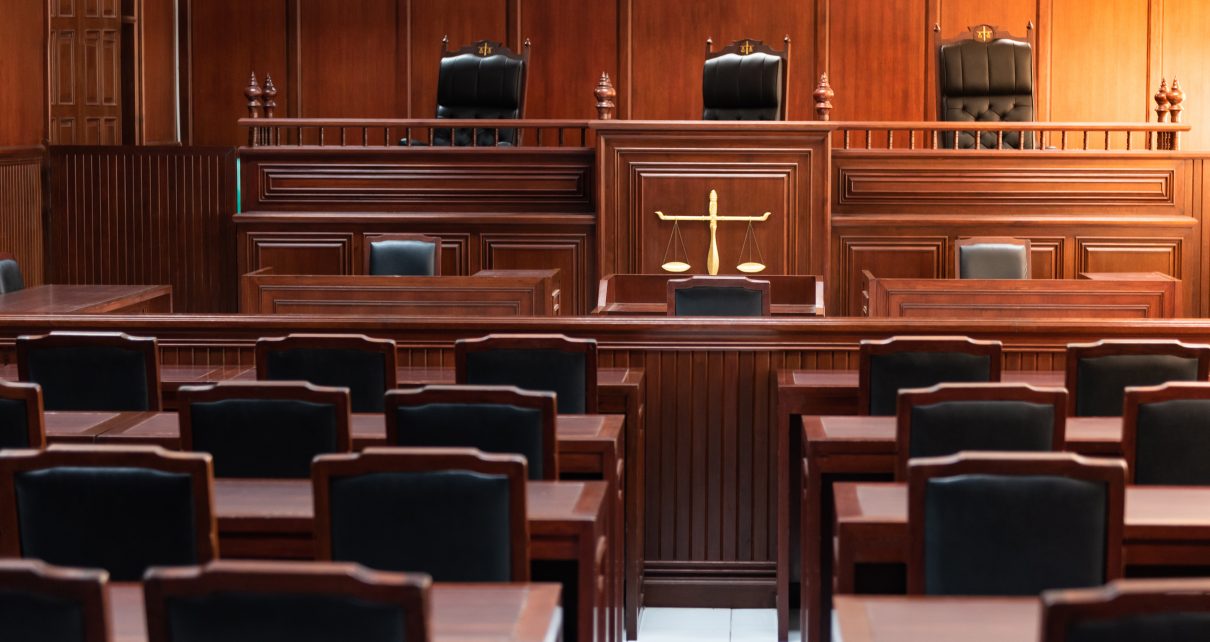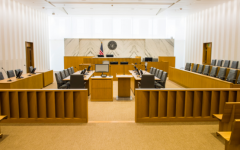
Justice Court. (Photo: Nirat.pix/Shutterstock)
Incidental Powers and Duties of Courts
The court may assess punitive damages against the plaintiff
By Chris Micheli, January 26, 2025 2:30 am
CCP Part 1, Title 1, Chapter 6, Article 2 concerns incidental powers and duties of courts of justice in California. Section 128 specifies that every court has the power to do eight tasks. In addition, if an order of contempt is made affecting an attorney, his or her agent, investigator, or any person acting under the attorney’s direction, the execution of any sentence is stayed pending the filing within three judicial days of a petition for extraordinary relief testing the lawfulness of the court’s order.
If an order of contempt is made affecting a public safety employee acting within the scope of employment for reason of the employee’s failure to comply with a duly issued subpoena or subpoena duces tecum, the execution of any sentence is stayed pending the filing within three judicial days of a petition for extraordinary relief testing the lawfulness of the court’s order.
This section defines the terms “public safety employee,” “sexual assault,” and “domestic violence.” No order of contempt is to be made affecting a county government or any member of its governing body acting pursuant to its constitutional or statutory authority unless the court finds that either of the two specified conditions exist.
Section 128.5 authorizes a trial court to order a party, the party’s attorney, or both, to pay the reasonable expenses, including attorney’s fees, incurred by another party as a result of actions or tactics, made in bad faith, that are frivolous or solely intended to cause unnecessary delay. This section also applies to judicial arbitration proceedings. This section defines the following terms: “actions or tactics” and “frivolous.”
Expenses pursuant to this section cannot be imposed except on notice contained in a party’s moving or responding papers or, on the court’s own motion, after notice and opportunity to be heard. An order imposing expenses must be in writing and recite in detail the action or tactic or circumstances justifying the order.
In addition, the court may assess punitive damages against the plaintiff on a determination by the court that the plaintiff’s action was an action maintained by a person convicted of a felony against the person’s victim, or the victim’s heirs, relatives, estate, or personal representative, for injuries arising from the acts for which the person was convicted of a felony, and that the plaintiff is guilty of fraud, oppression, or malice in maintaining the action.
However, this section does not apply to disclosures and discovery requests, responses, objections, and motions. Sanctions ordered pursuant to this section must be ordered pursuant to the eight specified conditions and procedures.
A motion for sanctions brought by a party or a party’s attorney primarily for an improper purpose, such as to harass or to cause unnecessary delay or needless increase in the cost of litigation, will itself be subject to a motion for sanctions. The liability imposed by this section is in addition to any other liability imposed by law for acts or omissions.
Section 128.7 specifies that every pleading, petition, written notice of motion, or other similar paper is required to be signed by at least one attorney of record in the attorney’s individual name, or, if the party is not represented by an attorney, signed by the party. Pleadings need not be verified or accompanied by affidavit. By presenting to the court, an attorney or unrepresented party is certifying that to the best of the person’s knowledge, information, and belief, formed after an inquiry reasonable under the circumstances, all of the four specified conditions are met.
If, after notice and a reasonable opportunity to respond, the court determines that there has been a violation, the court may, subject to the conditions specified, impose an appropriate sanction upon the attorneys, law firms, or parties. In determining what sanctions should be ordered, the court is required to consider whether a party seeking sanctions has exercised due diligence.
A motion for sanctions is required to be made separately from other motions or requests and must describe the specific conduct alleged to violate the law. Absent exceptional circumstances, a law firm is to be held jointly responsible for violations committed by its partners, associates, and employees.
In addition, the court may enter an order describing the specific conduct that appears to violate the law and directing an attorney, law firm, or party to show cause why it has not violated the law, unless, within 21 days of service of the order to show cause, the challenged paper, claim, defense, contention, allegation, or denial is withdrawn or appropriately corrected.
Monetary sanctions may not be awarded against a represented party for a violation of specified provisions. Also, monetary sanctions may not be awarded on the court’s motion unless the court issues its order to show cause before a voluntary dismissal or settlement of the claims made by or against the party that is, or whose attorneys are, to be sanctioned.
When imposing sanctions, the court is required to describe the conduct determined to constitute a violation and explain the basis for the sanction imposed. The court may assess punitive damages against the plaintiff upon a determination by the court that the plaintiff’s action was an action maintained by a person convicted of a felony against the person’s victim, or the victim’s heirs, relatives, estate, or personal representative, for injuries arising from the acts for which the person was convicted of a felony, and that the plaintiff is guilty of fraud, oppression, or malice in maintaining the action.
This section does not apply to disclosures and discovery requests, responses, objections, and motions. A motion for sanctions brought by a party or a party’s attorney primarily for an improper purpose, is itself subject to a motion for sanctions.
Section 129 provides that a copy, reproduction, or facsimile of any kind of a photograph, negative, or print, including instant photographs and video recordings, of the body, or any portion of the body, of a deceased person, taken by or for the coroner at the scene of death or in the course of a post mortem examination or autopsy, cannot be made or disseminated except in the manner specified in this section.
However, this section does not apply to the making or dissemination of a copy, reproduction, or facsimile for use in the field of forensic pathology, in medical or scientific education or research, or by a coroner or any law enforcement agency in the United States for investigative purposes, including identification and identification confirmation.
Section 130 provides, when a child who is under 18 years of age is killed as a result of a criminal act and a person has been convicted and sentenced for the commission of that criminal act, upon the request of a qualifying family member of the deceased child, the autopsy report and evidence associated with the examination of the victim in the possession of a public agency, is required to be sealed and not disclosed, with exceptions.
This section may not be invoked by a qualifying family member who has been charged with or convicted of any act in furtherance of the victim’s death. Upon the filing of those charges against a qualifying family member, any seal maintained at the request of that qualifying family member under this section must be removed. coroner or medical examiner is not liable for damages in a civil action for any reasonable act or omission taken in good faith in compliance with this section.
If sealing of the autopsy report has been requested by a qualifying family member and another qualifying family member opposes sealing, the opposing party may request a hearing in the superior court in the county with jurisdiction over the crime leading to the child’s death for a determination of whether the sealing should be maintained.
Nothing in this section limits the public access to information contained in the death certificate. When a medical examiner declines a request to provide a copy of an autopsy report that has been sealed pursuant to this section, the examiner must cite this section as the reason for declining to provide a copy of the report.
In addition, this section defines the following: “child who is under 18 years of age,” “evidence associated with the examination of a victim,” and “qualifying family member.”
- Conservation Banks - February 22, 2026
- Mergers of Unincorporated Associations - February 21, 2026
- A Historic Look at Bill Introductions in the California Legislature - February 21, 2026





One thought on “Incidental Powers and Duties of Courts”